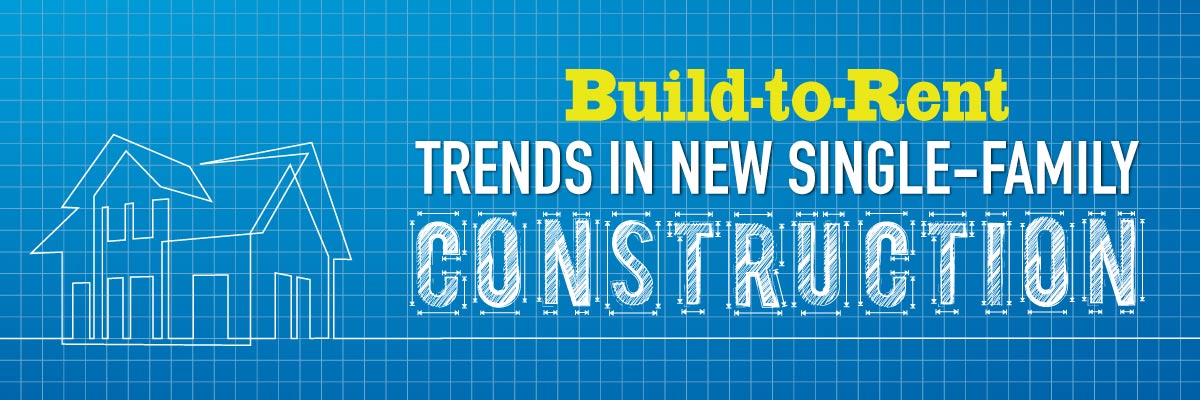What Do You Need to Know About the Single-Family Build-to-Rent Market?
November 17, 2021

A new type of rental option has been gaining market share recently—the single-family build-to-rent home. Single-family build-to-rent (BTR) homes and neighborhoods often look and feel the same as for-sale product. They are appealing to many renters because they offer more interior and exterior space than a typical rental apartment. The single-family BTR segment of the housing market is generating a lot of attention because of the large role institutional investors are playing in purchasing new single-family construction for the purpose of holding them as rental properties. Some major home builders have also begun building entire communities comprised of single-family rental homes.
How Many Single-Family BTR Homes Are in the Market?
According to data from the Census Bureau’s Quarterly Starts and Completions survey, construction was started on approximately 10,000 single-family BTR homes during the 2nd quarter of 2021. Over the last four quarters, an estimated 42,000 BTR homes began construction, which is up 8% compared to the prior four quarters.
Last year, in 2020, the number of single-family homes being built specifically to rent accounted for about 5% of all new single-family construction. Since then, the share of single-family homes being built for rent has dropped to under 4% of all new single-family starts. However, these numbers exclude single-family homes that are being sold by the builder to another party that intends to rent the property out. The National Association of Home Builders has estimated that this segment may represent another two or three percent of single-family starts and is a key driver of the growth of the single-family BTR market.
Who Owns Single-Family BTR Homes?
Single-family BTR homes are attracting new, large-scale investors as a result of the strong returns based on sustained demand, limited supply, and high prices in the for-sale market. There are several key players that own large numbers of single-family BTR homes, but the number and types of investors in this market segment have grown during the pandemic.
Institutional investors have put up more than $10 billion in single-family rentals over the past few years. American Homes 4 Rent is one of the biggest players in the single-family BTR space. The company began acquiring, renovating, and leasing existing single-family properties in 2012. Over the years, they have begun directly building new single-family BTR homes. American Homes 4 Rent owns more than 55,000 rental houses and built 1,600 new ones in 2020. The company expects to deliver more than 2,000 single-family BTR homes in 2021.
There are many other large-scale investors that own single-family BTR homes and communities, drawn to the market because of the fast-growing single-family rents and above-average returns on investment. Recognizing the growth demand, some home builders also have gotten into the single-family rental game. Major national home builders, including Toll Brothers, Lennar Homes, and D.R. Horton, have pivoted toward building single-family rentals. In addition, home building startups have emerged specifically to cater to the single-family BTR market.
Where are Single-Family BTR Homes Most Common?
The single-family BTR market has been strongest in Arizona, New Mexico, and Florida, although investor activity in the single-family rental market has increased in many markets throughout the country. According to some investors, in Virginia, the investor-led single-family BTR market has been strongest in the Greater Richmond and Hampton Roads markets, where single-family rents are surging and home prices are lower than in Northern Virginia. Investor activity in Virginia is poised to be relatively strong in markets where the demand for single-family rentals is rising, including in the state’s college and university towns.
Despite growth in the number of investors in the single-family rental market, they remain a very small share of the overall rental market. Overall, single-family rentals account for nearly 40% of the rental inventory in Virginia (including both single-family detached homes and townhomes). However, investors still own just a tiny share of those properties.
What is the Outlook for Single-Family BTR Market?
There are signs that the single-family BTR market will grow fast in the years to come. Hunter Housing Economics has forecasted that the number of single-family rentals built annually will double by 2024.
There are good reasons to expect single-family rentals to be in demand. First, Millennials are marrying and having children. Fast-rising home prices and high student-debt loads have put homeownership out of reach for many. These families will be looking for rental options that can provide them with a larger home and more outdoor space than an apartment can. Second, innovation in the single-family BTR product is creating new, cohesive, complete single-family home rental communities. These communities are being heavily marketed to renters who are looking to move to the suburbs.
How long institutional investors stay active in the single-family rental market depends on the size of the returns on their investments. At this point, all signs are for strong returns for the next several years.
Click here to send any comments or questions about this piece to Virginia REALTORS® Chief Economist Lisa Sturtevant, PhD.
You might also like…
The Shutdown’s Impact on the Housing Market
By Dominique Fair - November 3, 2025
The government shutdown, which started on Oct 1st, has left many of the 1.4 million federal workers without pay and is estimated to cost the economy between $7… Read More
Moving In or Out? Domestic Migration in Virginia
By Dominique Fair - October 29, 2025
In-migration is one of the key drivers of economic growth. It can help expand a state’s labor force, increase consumer spending, and lead to more residential development. Based… Read More
Key Takeaways: September 2025 Virginia Home Sales Report
By Virginia REALTORS® - October 22, 2025
Key Takeaways Home sales activity in Virginia increased in September, with sales levels continuing their upward trend since June. There were 8,783 closed sales across the commonwealth in… Read More